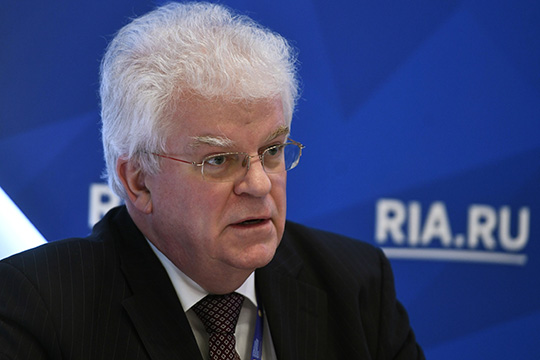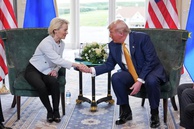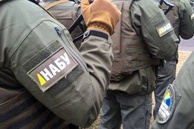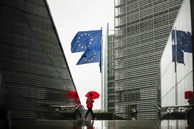During an online briefing at the Rossiya Segodnya multimedia center in Moscow, Russia’s envoy to the European Union, Vladimir Chizhov, commented on the decisions taken by the December 10-11 EU summit in Brussels, on the current state of Russia-EU relations and the situation in Europe amid the ongoing COVID-19 pandemic.
Russia - EU: general state of relations
Vladimir Chizhov characterized the relations now existing between Russia and the EU as being far from normal. On the one hand, the European Union remains the largest source of foreign investment in Russia. However, the overall volume of bilateral trade has shrunk, in part due to the falling demand for Russia’s main export commodity - oil and gas, caused by the global pandemic. Simultaneously, Moscow has recently been facing strong criticism of his policies, regularly coming from Brussels.
That said, the political dialogue between Moscow and Brussels continues, with five top-level and 30 high-level contacts having taken place in the outgoing year, most of them by telephone and in an online format. Amid the current pandemic, Russia’s permanent mission to the EU has had to bring its modus operandi in line with the restrictions imposed by the Belgian government. Vladimir Chizhov noted that Russia and the EU would equally benefit from a change in the current situation, but added that a return to the business as usual situation that existed before 2014 is both unrealistic and unnecessary.
“Relations between Moscow and Brussels should be more pragmatic and meaningful, without beautiful slogans and empty promises,” he stated.
EU summit: results and disagreements
Vladimir Chizhov singled out prospects for the implementation of the Joint Comprehensive Plan of Action on the Iranian nuclear problem as a major priority for the European Union. He added that just as he spoke, members of the Joint Commission for the implementation of this important document were meeting in Brussels to discuss this. Russia was represented there by Deputy Foreign Minister Sergei Ryabkov. As for the EU summit, Chizhov said it was just a regular event to sum up the results of the outgoing year 2020, to outline the prospects for the bloc’s 2021-2027 budget and a post-pandemic recovery plan for the member countries ("Next Generation EU”) to the tune of a whopping 1.8 trillion euros. However, the participants’ attention was mostly focused on the future of the "European Green Deal," alternative sources of energy and global climate change. The summit reiterated the EU members’ stated goal to achieve carbon neutrality by 2050. The EU leaders also discussed the UK’s drawn-out withdrawal from the Union (Brexit), which hits the home stretch in December.
The EU’s draft budget could have never been approved had it not been for a last-minute deal agreed by the participating heads of state and government that saw Hungary and Poland lift their veto of the bloc’s multi-year budget and Covid-19 recovery package. Budapest and Warsaw objected to the last to the fact that the distribution of funds from the new seven-year budget and the anti-crisis fund was linked to the EU members’ compliance with the rule of law. The leaders of these two East European countries have long been accused by Brussels of using administrative pressure to strengthen their positions. For example, in 2018, Poland introduced a new procedure for the appointment of judges who are no longer elected and now need to be approved by the government. Hungary and Poland are both known for their conservative sentiments and opposition to the EU’s migration policies.
Warsaw and Budapest dismissed the accusations as “political blackmail" and threatened to block the adoption of the financial package. To break the logjam, Brussels had to perform miracles of verbal wire dancing, giving Warsaw and Budapest the right to defend their position in the European Court. For their part, they will request documents prepared by the European Commission for compliance with the provisions of the Lisbon Treaty. Pending the Court’s ruling, the provision linking the allocation of funds to compliance with the law will not apply.
During the summit, the 27 EU leaders called for measures to “ensure the safety” of the Astravets nuclear power station (BelNPP) in Belarus. Vladimir Chizhov said he was surprised by this, adding that he hoped that the plant’s operation would no longer be a subject of political huggermugger by Brussels. The BelNPP is being built by Atomstroiproekt (a company that is part of the Rosatom Corporation) in keeping with a standard Russian project of a new generation, and will feature two reactors of 1,200 MW each. On November 3, the station’s first unit was added to the country’s united energy system and four days later, reached a capacity of 400 MW. The BelNPP is scheduled to enter commercial operation in the first quarter of 2021.
Vladimir Chizhov believes that the EU’s negative attitude towards this project stems from the position of Lithuania, which is wary of the fact that the BelNPP is being built by Russian specialists in Astrovets, which is 30 kilometers away from its capital, Vilnius. Just because the plant is being constructed by Russians apparently gives the Lithuanians a “reason” to fear a repetition of the 1986 Chernobyl disaster. Meanwhile, Finland has already explained to the Lithuanian politicians just how wrong they are, since the Loviisa nuclear power station that the Soviet Union helped build in this northern country in 1977-1980, is still operating safely and giving the Finns absolutely no reason to worry about.
All these arguments apparently had no effect on the European Union, which gave a strangely-worded response, saying that “the European Commission has been instructed to work out measures, preventing commercial electricity imports from third countries’ nuclear facilities.” Chizhov described this requirement as absurd, primarily from the technological standpoint: “Electricity from each station gets into the general network. It doesn't say exactly where it was generated."
Commenting on the new sanctions list being prepared by Brussels against Belarusian officials, Chizhov said that this only testifies to the lack of a well thought-out position on the part of the European Union.
“The intellectual inadequacy of those who invented this is evident. Minsk has repeatedly demonstrated its complete indifference to any sanctions against it,” he noted.
According to the Russian envoy, in this day and age, sanctions mechanisms are of little help to the West, no matter what regimes such sanctions are used against.
“For example, the United States has been imposing sanctions against Cuba since the early 1960s, but Cuba has survived and keeps developing. Sanctions were also imposed against the Taliban movement (banned in Russia) operating in Afghanistan. US troops have been deployed in that country since 2001, and where are the Taliban now? They remain active and Washington is now negotiating with them,” Chizhov explained.
The fight for the vaccine
When asked about the prospects of Russia and the European Union working closer together in the fight against the COVID-19 pandemic, Vladimir Chizhov said he was pretty skeptical about this. He said that as soon as it became known that Russia was working on a vaccine against this virus, an active campaign was unleashed in the foreign media to prevent its possible use in the EU countries.
According to Vladimir Chizhov, the European Medicines Agency (EMA) is being pressured to certify the coronavirus vaccine produced by Pfizer and BioNTech. The former was supposed to be licensed on December 29, but now it looks like the date has been moved up to December 21.
Russia, meanwhile, is offering its vaccine against COVID-19 to other countries without any strings attached.
“The main reason why we have developed this drug was not to 'conquer' the EU, but to ensure the health of our own people. Since the Sputnik V vaccine has proved itself as a reliable and effective drug, the Russian Direct Investment Fund invited this country’s partners from across the EU to produce this vaccine in their countries. Hungary showed a great deal of interest in our proposal and so we sent them an experimental batch. A tug of war between the European Commission and Budapest ensued and, as a result, the EC had to admit that in some cases the use of drugs not certified by the EMA is possible, but only on the territory of an individual country, not throughout the EU,” Chizhov said.
EU migration policy: any changes ahead?
Following the terrorist attacks in Vienna and Paris, the EU decided to tighten its migration policy. French President Emmanuel Macron took the toughest stand demanding that visitors from the Middle East and North Africa comply with the standards and norms of the European Union. The Belgian government took a similar stand with one Cabinet minister saying, according to Vladimir Chizhov, that if the tide of uncontrolled migration is not stemmed, a third of all those living in sub-Saharan Africa will arrive in the EU in a matter of just one year. The situation provokes the growth of religious fundamentalism and the terrorist threat in the Old World.
The tough rhetoric used by officials in Brussels, Paris and Vienna do not obviate Europe's ever-growing need for outside labor though. With the population of the EU countries quickly ageing, they simply can’t do without migrant workers. Exactly what the EU is going to do about this is hard to say. Thus far, all that the EU leaders have managed to do are measures to contain the influx of migrants, including through the conclusion of a deal with Erdogan. However, the patience of the Turkish president is running low, which means that a new stream of refugees may pour into Central Europe any time, moving via Italy and the Balkans.
EU and Turkey: enmity or compromise?
As for the EU’s relations with Turkey, here, despite numerous disagreements, Brussels looks more likely to seek a compromise with Recep Tayyip Erdogan.
“There has been talk going on the past two years about sanctions against Ankara, and with pretty good reason too, given Turkey’s unauthorized offshore drilling for oil in the Eastern Mediterranean, and its arbitrary interpretation of the international maritime law. The public dispute between Macron and Erdogan did spill out into the European media, but the matter did not go any further with just a handful of Turkish officials added to the sanctions list. Even though Turkey remains on the list of candidates for EU membership, their mutual attraction has lost some of its pull. We will see what happens next,” Vladimir Chizhov noted.
Baltic track
The situation along Russia’s borders remains tense. In early December 2020, several Russian journalists were detained in Latvia on charges of working for the Russian Sputnik news agency and the news portal Baltnews, both owned by the Rossiya Segodnya holding. Currently released on condition they do not leave the country, the journalists face between 4 to 8 years in prison. Vladimir Chizhov said that although the EU is likely to ignore this problem, the grounds for the arrests and searches of the Russian journalists can be disputed.
“It is Dmitry Kiselev, the head of the Rossiya Segodnya holding, who is under sanctions, but this certainly doesn’t mean that all activities of the holding are. Journalists have every right to bring their case before the EU Court and have it considered."
EU on the eve of Brexit
The EU summit also discussed the issue of Britain's upcoming withdrawal. Even though Brexit is officially slated for the night from December 31, 2020 to January 1, 2021, many problems remain.
“They essentially discussed their relations post-Brexit. If the exit comes without a deal, the European Union and the United Kingdom will maintain their trade relations in line with the existing WTO rules, without any slack,” Chizhov noted.
The "Biden factor"
Joe Biden's election as America’s next president sparked some excitement in Brussels, but, unlike the sense of euphoria they felt about the election of Barack Obama 12 years ago (this phenomenon has since been known as “Obamomania"), this time round the EU leaders take a more sober view of the situation. They apparently realize that Washington’s policy will now change in many ways. With Biden in the White House, the US will return to the World Health Organization, change its attitude towards the World Trade Organization, and even resume its participation in the Joint Comprehensive Plan of Action on the Iranian nuclear program. One shouldn’t expect too many surprises here though, because even if the transatlantic contradictions may lose some of their acuteness, they will not go anywhere. Brussels' course towards strategic autonomy may be adjusted, but the slogan itself will remain. Joe Biden is more pro-NATO than Trump, who has repeatedly questioned the viability of the North Atlantic alliance, but the requirement to pay 2 percent of GDP for defense, as provisioned by the organization's charter, will also remain," Chizhov noted.
Europe needs "Nord Stream 2" more than anyone else”
During the briefing, journalists also inquired about the future of the Nord Stream 2 gas pipeline. Vladimir Chizhov said that the project is currently close to completion, and was 94 percent ready before the onset of the coronavirus pandemic. He added, however, that despite the change of guard in the White House, the United States is unlikely to change its opposition to Nord Stream 2 and the Turkish Stream.
“What we basically see here is unfair competition. Washington, by hook or by crook, is pushing the idea of selling its liquefied gas to Europe. Berlin is all set to complete the construction of the Nord Stream 2 pipeline. Some European countries tried to prevent this, but they failed,” the diplomat emphasized.
In conclusion, Vladimir Chizhov said that Nord Stream 2 was not invented by Moscow.
“The idea to build this gas pipeline was initially pitched by European companies - partners of Gazprom. Therefore, we are mystified by the position of the United States, which is trying to convince the EU partners that Nord Stream 2 is a threat to their energy security, because exactly the opposite is true, as the project is designed to strengthen it."
read more in our Telegram-channel https://t.me/The_International_Affairs

 12:44 22.12.2020 •
12:44 22.12.2020 •



























